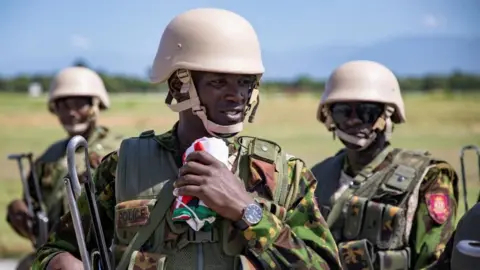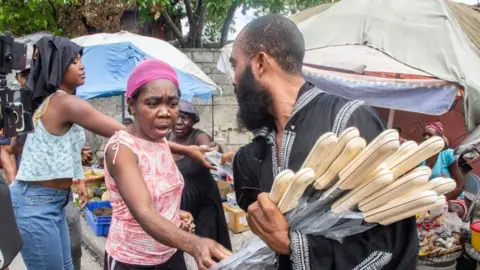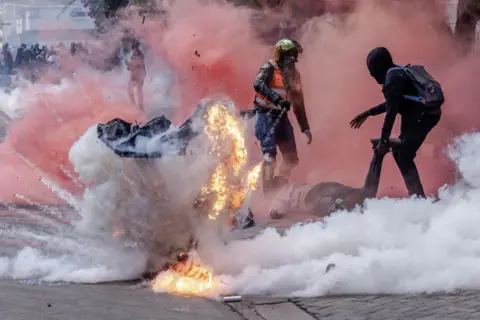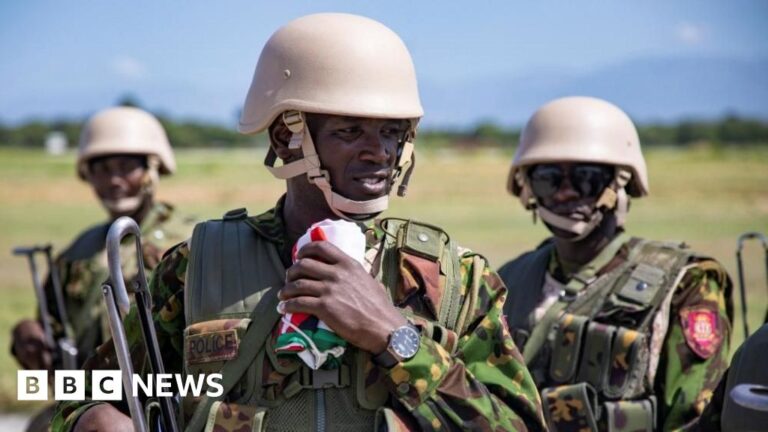By Marina Daras, Gloria Aradi and Pascal Fletcher, BBC News and BBC Monitoring
 Reuters
ReutersAfter months of controversy and ongoing legal challenges, Kenya has sent its first deployment of 400 police officers to combat gang violence in Haiti.
Rocked by decades of instability, the Caribbean nation saw an escalation of violence following the assassination of President Jovenel Moïse three years ago.
Rival armed groups took control of the capital, Port-au-Prince, earlier this year, forcing Prime Minister Ariel Henry to resign weeks later.
Armed gangs now control around 80% of the city.
A “robust use of force” is necessary to confront it, says the UN, which has approved a police mission made up of 2,500 officers from various countries, including 1,000 promised by Kenyan President William Ruto.
But Mr Ruto’s decision has sparked fierce opposition at home, particularly because Kenyan police are accused of committing abuses in their own country.
Working with Haitian police and based in a U.S.-built base, Kenyan officers will aim to retake key sites that have fallen under gang control, including the airport and nearby seaports.
Haiti has not had an election since 2016.
Elections must therefore be held within a year, and to enable this to happen, the Kenyan-led mission is tasked with restoring security.
Their deployment is authorized for one year, with a review after nine months.
What will the Kenyan police find in Haiti?
Gang violence killed or injured an average of more than one person per hour in the first three months of this year, according to UN data.
Nearly 600,000 Haitians have been forced to leave their homes, according to the U.N. migration agency.
Schools and police stations have in some places been transformed into refuges by families fleeing the violence.
The Haitian police force has only 9,000 officers. In contrast, up to 8,000 Haitians are estimated to belong to some 200 armed gangs – with roles ranging from commanders to informants. Recruitment has increased in recent years.
Gangs now have as much firepower as the police, says Emmanuel Paul, a security adviser who works with humanitarian groups in Haiti.
“Almost the same types of weapons are used on both sides – classic assault rifles, AK-47 Kalashnikovs of different brands,” he told the BBC.
Colombian President Gustavo Petro even accused his country’s army of selling missiles and munitions to armed men, who could have smuggled them into Haiti.
Why is Kenya doing this?
 Getty Images
Getty Images“We are doing this for the Haitian people. Responsibility for security in Haiti is a shared responsibility,” Ruto said.
But critics say Kenya is only obeying orders from the United States and hoping to curry favor with the superpower, particularly on the security front.
During a recent visit to Washington, Mr. Ruto also spoke of the desire to strengthen Kenya’s international position in this area.
The subsequent designation of the East African country as a major non-NATO ally by the United States certainly helped achieve this goal.
But domestically, President Ruto faces significant opposition and Kenya’s High Court has ruled the deployment was illegal. That has delayed the arrival of the first officers.
The court said the Kenyan government did not have the authority to send police officers abroad without a prior reciprocal agreement.
Such an agreement was subsequently signed on March 1, but the opposition Thirdway Alliance Kenya party filed a new complaint, arguing that the deployment remains unlawful.
“This mission is sanctioned by the United Nations (UN). The request came from the UN and the United States. There is no request from Haiti and there is none either that is likely to be put in place,” said Charles Midega, lawyer for the petitioners.
“The president did not follow the procedure laid down in the Kenyan constitution and laws on deployment. And above all, the president did not declare Haiti as a reciprocal country, a prerequisite for deployment. »
Are the Kenyan police ready for this kind of mission?
Although Kenya has a history of participating in peacekeeping missions, its police force has never set foot outside Africa.
The deployed unit is believed to come from the General Service Unit (GSU), a paramilitary branch often deployed during protests and terrorist attacks.
It has not been used against international criminal networks like Haitian gangs.
But the Kenyan government said the deployed officers received specialized training, including lessons in French and Haitian Creole to facilitate communication with their counterparts.
Another obstacle in sight will be the chain of command.
“There will be a Kenyan police force, but other countries are sending soldiers,” explains Mr. Paul.
“That’s going to be the first puzzle of the mission: how to coordinate the police and the army, given that they have different training and different missions.”
The new Commander Godfrey Otunge will spearhead the Kenyan taskforce and will have a tough task ahead.
How effective is the Kenyan police?
 AFP
AFPKenyan police officers have long been criticized for their human rights abuses, and several rights groups have expressed concerns about their deployment to Haiti.
On Tuesday, police in Kenya’s capital Nairobi were accused of firing live ammunition at anti-tax increase protesters.
The Kenya Medical Association said at least five people were shot and killed.
Mr Ruto defended the police, saying “legitimate” protests had been “hijacked by a group of organized criminals”.
In a letter to the UN Security Council last August, Amnesty International highlighted the excessive use of force by the Kenyan police.
It also accuses Kenyan police of killing dozens of protesters last year and illegally arresting and detaining others.
But police chief Japhet Koome denied the claim and last year accused opposition politicians of dumping rented corpses in morgues at protest sites to blame the deaths on his party. staff.
How have previous foreign interventions played out in Haiti?
Haiti has experienced three major peacekeeping missions in the past 30 years, which have failed to prevent a further worsening of the crisis.
In 1994, some 25,000 troops from Caribbean countries were sent in a UN-mandated operation.
Ten years later, 9,000 UN peacekeepers, led by Brazil and known as Minustah, were sent.
This time around, the UN-mandated task force is estimated to have a maximum of 3,000 officers, including civilian contractors deployed on site for logistical support.
Haiti’s transitional presidential council recently appointed former Prime Minister Garry Conille to lead the country until elections are held.
Haitians have seen peacekeeping missions come and go, without achieving stability.
They are hoping for a different result this time.
Additional reporting by Natasha Booty
Related stories:
 Getty Images/BBC
Getty Images/BBC


